It’s difficult for an academic historian to critique popular history books on the Middle Ages without sounding snotty, or dry, or some unappetising combination of both. Popular history books are where the majority of general readers encounter the medieval past. The issue is that many of the popular history works about the Middle Ages best represented in local libraries and second-hand bookshops are not particularly good.
Judging from my casual conversations with people, they’re most likely to have read works such as William Manchester’s egregious A World Lit Only By Fire: The Medieval Mind and the Renaissance (1992), which was a New York Times bestseller and an unabashedly shoddy hatchet job on the medieval world, or Barbara Tuchman’s A Distant Mirror: The Calamitous 14th Century (1978), which spins a yarn good enough to win a U.S. National Book Award and does a better job with the sources than does Manchester, but whose arguments were dated even when it was first published. (Let’s not even get started on the person who once told me, in all seriousness, that they’d learned a great deal about medieval Italy from reading The Da Vinci Code. I still get the night sweats thinking about it.)
It’s much easier, however, to push good books on people than to sneer at what they have already read in good faith. All the titles listed here are in English, and should be accessible to the interested general reader, or academic non-specialist. I’ve also tried to only include works which aren’t too expensive (as far as medieval history books go), or which should be available cheaply secondhand.
Getting Started
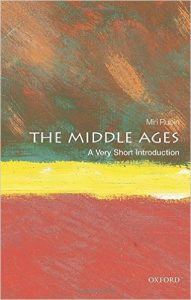 Miri Rubin. The Middle Ages: A Very Short Introduction (2014).
Miri Rubin. The Middle Ages: A Very Short Introduction (2014).
Find it: Indiebound | Publisher | Local Library
This little paperback does exactly what it promises on the cover: provides a very short introduction to the Middle Ages. In just 120 pages, Miri Rubin covers the ways in which medieval Europeans thought society should work and what salvation would look like, how they treated minorities and what points of connection we can see between the Middle Ages and the modern world. This is a straightforward refutation of the idea that the Middle Ages were a benighted and backwards time.
 Chris Wickham. Medieval Europe (2016).
Chris Wickham. Medieval Europe (2016).
Find it: Indiebound | Publisher | Local Library
If you’re looking for a slightly more extensive introduction than Rubin’s Very Short Introduction, Chris Wickham’s Medieval Europe is probably the most up-to-date broad introduction available. Wickham covers the broad sweep of the thousand years between the end of the Roman Empire in the West to the Reformation, taking in some of the key social, economic, and political factors that shaped medieval Europe. Byzantium, the Islamic world, and Eastern Europe all feature—essential areas to consider, yet ones which are often omitted in standard surveys.
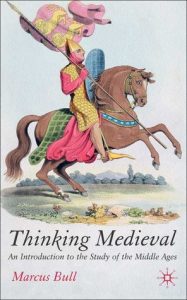 Marcus Bull. Thinking Medieval: An Introduction to the Study of the Middle Ages (2005).
Marcus Bull. Thinking Medieval: An Introduction to the Study of the Middle Ages (2005).
Find it: Indiebound | Publisher | Local Library
If you want to step back and consider why we think about the Middle Ages in the ways that we do, pick up Marcus Bull’s Thinking Medieval. It’s compact but wide-ranging, looking at the stereotypes and representations of the Middle Ages in film, television, and the press—from Ivanhoe to A Connecticut Yankee in King Arthur’s Court and Pulp Fiction—and exploring why they are so persistent. Though written with the college classroom in mind, I think it’s also accessible to the general reader with an interest in understanding why the remote past matters.
Digging Deeper
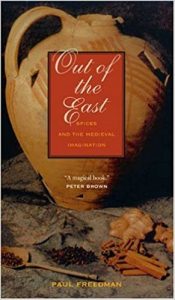 Paul Freedman. Out of the East: Spices and the Medieval Imagination (2008).
Paul Freedman. Out of the East: Spices and the Medieval Imagination (2008).
Find it: Indiebound | Publisher | Local Library
There’s a popular misconception that before Columbus’ sailed west across the Atlantic, medieval Europe was cut off from the rest of the world. Yet in Out of the East, Paul Freedman explores how trade—in particular the spice trade—had long linked Europe with parts of the world far distant from it. Traders were drawn east in search of pepper, cinnamon, cardamom, and other culinary and medicinal luxuries—and medieval Europeans enjoyed heavily spiced food that often resembled what we’d think of as quintessentially Asian or Middle Eastern food today.
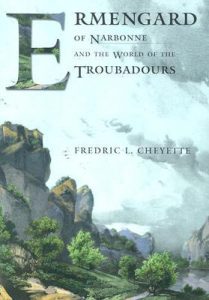 Fredric L. Cheyette, Ermengard of Narbonne and the World of the Troubadours.
Fredric L. Cheyette, Ermengard of Narbonne and the World of the Troubadours.
Find it: Indiebound | Publisher | Local Library
In the late twelfth century, a woman named Ermengard, viscountess of Narbonne ruled across a large swathe of what is now southern France. Fredric Cheyette sets out to rescue her from the historical shadows. This is a hefty book, but one which provides some fascinating insight into the political and social contexts of this period—what it meant for a woman to be the lord of an important port city in a region home to one of the Middle Ages’ most famous heresies.
 Barbara Hanawalt. The Ties that Bound: Peasant Families in Medieval England (1986).
Barbara Hanawalt. The Ties that Bound: Peasant Families in Medieval England (1986).
Find it: Indiebound | Publisher | Local Library
How did peasants in medieval England—the vast majority of the population—care for their children and their elderly? What games did they play? What did their homes look like? In The Ties that Bound, Barbara Hanawalt made pioneering use of late medieval coroners’ rolls to uncover details of the daily lives of peasants in fourteenth- and fifteenth-century England—and to show people who were as distinct and complex as anyone nowadays.
The Medieval and the Modern
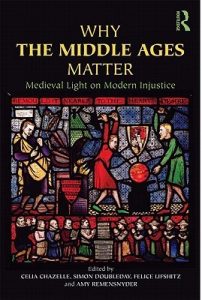 Celia Chazelle et al. Why the Middle Ages Matter: Medieval Light on Modern Injustice (2011).
Celia Chazelle et al. Why the Middle Ages Matter: Medieval Light on Modern Injustice (2011).
Find it: Indiebound | Publisher | Local Library
This thought-provoking collection of essays sets out to prove the assertion in its title. The various essays—on topics as diverse as healthcare, crime and punishment, and clerical sexual scandals—argue that while the Middle Ages may not provide neat solutions to modern social problems, then they do at least offer us new ways of approaching them. After all, “medieval” is not, and should not be used as, a simple synonym for “barbaric”, any more than “modern” is a synonym for “progress.”
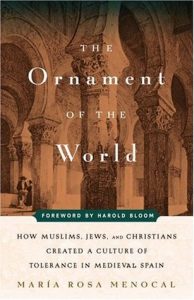 María Rosa Menocal. The Ornament of the World: How Muslims, Jews, and Christians Created a Culture of Tolerance in Medieval Spain (2002).
María Rosa Menocal. The Ornament of the World: How Muslims, Jews, and Christians Created a Culture of Tolerance in Medieval Spain (2002).
Find it: Indiebound | Publisher | Local Library
The “clash of civilisations” narrative—of an irreparable, binary conflict between the Christian West and the Muslim World—is used by many to explain contemporary political conflicts. Yet religious polarisation is hardly inevitable, and in The Ornament of the World, María Rosa Menocal explores the diverse and vibrant culture created by Muslims, Jews, and Christians in medieval Iberia. This multi-cultural society was one of the most advanced in medieval Europe. Menocal’s recreation of the glories of al-Andalus is perhaps at times an overly rosy one, but this is still a useful introduction to a period that’s still too-little known.
 Patrick Geary. The Myth of Nations: The Medieval Origins of Europe (2003).
Patrick Geary. The Myth of Nations: The Medieval Origins of Europe (2003).
Find it: Indiebound | Publisher | Local Library
Nationalism is undergoing a resurgence in Western politics—Brexit and the election of Donald Trump being the two most prominent examples. Much of these ideologies are predicated on certain views of medieval history, but here Patrick Geary argues that ethno-nationalism has more to do with myth than with history—that its rallying cries date back to the nineteenth century, not to the Middle Ages. Geary packs a lot of argument into a relatively brief space, and even if you don’t agree with all of his conclusions, The Myth of Nations is sure to spark much further reflection.
That’s nine great books to start with, but there are lots more out there. If there are other books about medieval history that you’d particularly recommend to a beginning reader (or really wish that people would avoid), feel free to leave a comment below!

Thanks for this list. Any suggestions for books addressing medieval history in Eastern Europe?
I’m glad you liked it, Robin! Wickham’s Medieval Europe, mentioned above, does bring in Russia, eastern Europe, and Byzantium, which is one of the reasons why I listed it.
Sadly though, there is still comparatively little scholarship in English that focuses on medieval Eastern Europe, and the field gets winnowed down again if you’re looking for books that are accessible to the general reader and that don’t cost $200+. Keeping cost and accessibility in mind, I’d recommend some of Cambridge University Press’s medieval textbook series, which is less eyewateringly expensive than most: Central Europe in the High Middle Ages: Bohemia, Hungary and Poland, c. 900-c.1300, the second edition of Medieval Russia, 980-1584 and Southeastern Europe in the Middle Ages, 500-1250.
Thanks very much! I’ll put them on my Amazon list & check if my local library has any of these titles.
I’m so glad the recommendations were useful to you, and hope you enjoy them!
This comment was originally posted as a Storify, before that service shut down.
Over on Twitter, several people shared their experiences in reading or using these texts in the classroom:
Several people added their own additional recommendations, from Miri Rubin’s Hollow Crown, on late medieval Britain…
… to a collection of essays on “how medieval people professed Christianity, how they performed gender, and how the two coincided.”
Mary Springer suggested a classic, Marilyn Stokstad’s Medieval Art…
And lastly a whole batch of recommendations:
Hy Yvonne….thank you for the recommended books…it’s hard for a novice (as I am) to go through the abundant literature and filter out the more valuable ones….
I have to admit I’ve enjoyed reading the books of Dan Jones and some of Alison Weir….
But read Chris Wickham Medieval Europe. Also The First Crusade by Thomas Asbridge and currently By Sword and Fire by Sean McGlynn. (and some more).
Now I try to find new reads through the footnotes and books/authors mentioned in the ones I’m reading.
It’s a fascinating time period, one “we” all think to know something about, but mostly it’s a vague caricature at best.
So (do I dare ask….no, but I’ll do anyway) if there are some more do’s and don’ts in literature, or titels that could be considered a must read….would you…..😳😬☺️….?
With kind regards Yuri
Thank you for the booklist Yvonne.
It’s hard for a novice (even a 51 year old one like me) to go through the abundance of writings and filter out the valuable ones.
I do admit I’ve enjoyed reading books by Dan Jones and Alison Weir….but I’m longing for more factual and indebt readings.
I’ve read Chris Wickham Medieval Europe, Thomas As ridge The First Crusade, and currently By Sword and Fire by Sean McGlynn.
I try to find new reads through the footnotes and quoted autors in books like these.
It’s a endlessly fascinating periode.
One we all think to know one or more things about, but mostly it’s a vague caricature at best.
So….(do I dare ask….no…but I’ll do anyway) …if you would have some more do’s and don’ts on what to read, or some thing you would recommend….would you….? 😬😳☺️
With kind regards Yuri
Hi Yuri, I’m glad you found the list useful! In addition to what’s listed here, you might enjoy Christopher de Hamel’s Meetings with Remarkable Manuscripts, Anders Winroth’s The Age of the Vkings, or Simon Doubleday’s The Wise King. As a general rule of thumb, looking for books by scholars with a qualification in the field is a good place to start, as is looking at the book’s bibliography (is there one? Does it seem like the author has done much reading in archival/primary sources? Is the bibliography up-to-date? etc.) Enjoy your reading!
Thank you for this introductory reading list. It is indeed not easy for a non-specialist let alone a non-historian to discern between quality and rubbish. Given that there’s so precious little time for reading even mediocre works are a waste of time and I’d rather not assimilate wrong or outdated ideas. Which is why informed advice of learned specialists such as yourself is invaluable.
With that in mind: what do you think of the two volumes on the Middle Ages in the Penguin history of Europe series? “The Inheritance of Rome: A History of Europe van 400 tot 1000” by Chris Wickham and “Europe in the High Middle Ages” by William Chester Jordan. One of the books on your list was also written by Wickham, the Penguin books aremuch older and a thousand years is a lot to treat in one volume so I’m wondering which one(s) to choose.
Besides a general overview of the period I’m mostly interested in the broad cultural history of the European Middle Ages as context to medieval literary works, works of art, philosophy and musical compositions. I know more or less which histories of those disciplines to consult but a suggestion for a broad cultural history of the Middle Ages would be most helpful. I’ve read Huizingha “The waning of the Middle Ages” which is quite illuminating but that book only covers the late Middle Ages as the title suggests and then only with regard to France and The Netherlands if memory serves.
If my question is too broad several suggestions are of course more than welcome.
Thank you in advance.